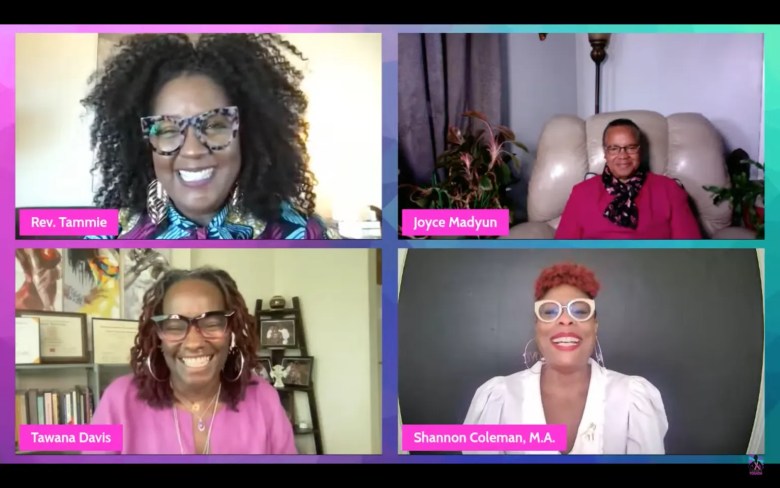This story was first published by The Sacramento Observer.
The “strong Black woman” stereotype, a deeply ingrained cultural concept, often pressures Black women to suppress emotions and prioritize the needs of others over their own health. This has significant implications for Black women’s breast cancer experiences, leading to disparities in care and outcomes.
Project SOAR Awakenings, an innovative intervention, seeks to dismantle this stereotype and promote the well-being and health of Black breast cancer survivors by informing ethnocentric clinical care pathways. Led by Rev. Dr. Tammie Denyse, president and co-founder of Carrie’s TOUCH, and Dr. Annette L. Stanton, a professor in UCLA’s Department of Psychology, Project SOAR Awakenings emerged from seven years of extensive research into Black women’s breast cancer experiences. The initiative utilizes culturally curated focus groups, aptly named “gatherings,” to create a safe and open space for women to share stories and challenges.
The project’s future is deeply linked to Carrie’s TOUCH’s origin story.
“Twenty years ago, when I was diagnosed as a breast cancer survivor, my doctors kept talking about death,” Denyse says. “They said, ‘You’ve got an aggressive cancer, you’ll be dead in less than five years. Here are the statistics. Black women die at this rate. Oh, you have family genetics, so that also increases your level of death.’ I just got to the point that I told my doctor, ‘Stop talking to me about death and start telling me how I can live.’”
At her next appointment, Denyse’s doctor brought a clinical trial to her attention. She asked how Black women were responding to the trial thus far and learned there weren’t enough in the trial to be studied as a subset. Wanting to change that, Denyse signed up. She committed to learning more about gold standard research, research terminology and how information is weighed after it has been gathered.
“Black women die at 41% higher rates from breast cancer than white women do,” she says. “They’ve said that the entire 20 years that I’ve been a survivor. In 20 years it has not lessened at all.
“Even though the number of women surviving cancer has improved exponentially, there’s still this disparity in mortality between Black women and white women. So I have been asking the question for 20 years: why? Well, what I later learned is that ‘why?’ is not a sufficient research question. And I said, ‘Well, y’all are asking all of these fancy questions that aren’t getting you any closer to any answers that would lead us to closing this gap. What I care about is closing this gap. How do we close this gap?’”
In a published paper on Project SOAR’s impact, participants described a historical legacy of bearing emotionally damaging experiences and continuously pushing through life, often neglecting their own needs. Their names were changed in the research paper to protect their privacy.

Maxine, a two-month survivor, cited historical examples of violence and systemic racism. Brenda, a 10-year survivor, echoed this sentiment, stating that strong Black women are the backbone of their race, caring for everyone while often forgetting to take time for themselves.
Navigating intersecting identities — being strong, Black, a woman, and a cancer patient — adds another layer of stress.
Maxine emphasized the innate stresses of being a Black woman, compounded by self-imposed expectations and the brutal reality of breast cancer.
Nora, a 14-year survivor, spoke of the overwhelming expectation to manage all aspects of life — family, work, finances — leading to a feeling of having no choice but to continue.
The diagnosis and treatment of breast cancer also can challenge a woman’s perception of her own strength. Florence, a two-year survivor, described the struggle of chemotherapy, which made her feel weak and in conflict with her identity as a strong Black woman. Janet, a five-year survivor, expressed regret for not embracing help, feeling compelled to “motor through” to avoid appearing as an “invalid.”
Project SOAR Awakenings aims to inform patient-centered care, as Denyse says patients’ voices should “ground” the treatment they receive. Organizers also want participants to see themselves as worthy of focus and focused care.
“What we hope to achieve is that women walk away from Project SOAR saying, ‘You know what, maybe I am going to prioritize myself this once a week over making sure that everybody else is all right. You know what, maybe I will accept help.’”
Denyse admits that trying to address health equity in today’s climate is difficult, with government backlash and cuts to programs that address specific ethnic groups.
“We are facing that every day as an organization and I’m having conversations every day,” Denyse says.
She remains unapologetic about the work.
“I’m a Black woman and I can’t be anything other than a Black woman,” she says. “Cancer is cancer. Currently, the buzzwords are you can’t say ‘woman,’ you can’t say ‘breast,’ you can’t say ‘cancer,’ and that’s all we are. I am not going to bend who we are as a Black organization. We serve anybody you know, but primarily Black women; because of the high mortality rates, we have been greatly impacted.”
Carrie’s TOUCH had been counting on federal funds to expand Awakenings into an in-person model, but interaction will remain virtual thanks to smaller funds secured by Stanton. Black women diagnosed with breast cancer are encouraged to enroll in upcoming cohorts of Project SOAR Awakenings. The first cohort started this month and enrollment is open for a second group that begins in November. For eligibility and enrollment information, visit carriestouch.org.
Genoa Barrow is the senior staff writer at The Sacramento Observer.


You must be logged in to post a comment.